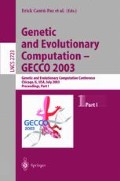Abstract
Designing an adequate fitness function requires substantial knowledge of a problem and of features that indicate progress towards a solution. Coevolution takes the human out of the loop by dynamically constructing the evaluation function based on interactions between evolving individuals. A question is to what extent such automatic evaluation can be adequate. We define the notion of an ideal evaluation function. It is shown that coevolution can in principle achieve ideal evaluation. Moreover, progress towards ideal evaluation can be measured. This observation leads to an algorithm for coevolution. The algorithm makes stable progress on several challenging abstract test problems.
Access this chapter
Tax calculation will be finalised at checkout
Purchases are for personal use only
Preview
Unable to display preview. Download preview PDF.
References
Anthony Bucci and Jordan B. Pollack. Order-theoretic analysis of coevolution problems: Coevolutionary statics. In Proceedings of the GECCO-2002 Workshop on Coevolution: Understanding Coevolution, 2002.
D. Cliff and G. F. Miller. Tracking the Red Queen: Measurements of adaptive progress in co-evolutionary simulations. In F. Morán, A. Moreno, J. J. Merelo, and P. Chacón, editors, Proceedings of the Third European Conference on Artificial Life: Advances in Artificial Life, volume 929 of LNAI, pages 200–218, Berlin, 1995. Springer.
Edwin D. De Jong and Jordan B. Pollack. Principled Evaluation in Coevolution. Technical Report CS-02-225, Brandeis University, May 31, 2002.
Edwin D. De Jong and Jordan B. Pollack. Ideal evaluation from coevolution. Evolutionary Computation, accepted for publication.
Kalyanmoy Deb. Multi-Objective Optimization Using Evolutionary Algorithms. Wiley & Sons, New York, NY, 2001.
Sevan G. Ficici and Jordan B. Pollack. A game-theoretic approach to the simple coevolutionary algorithm. In M. Schoenauer, K. Deb, G. Rudolph, X. Yao, E. Lutton, J. Julian Merelo, and H.-P. Schwefel, editors, Parallel Problem Solving from Nature, PPSN-VI, volume 1917 of LNCS, Berlin, 2000. Springer.
Sevan G. Ficici and Jordan B. Pollack. Pareto optimality in coevolutionary learning. In Jozef Kelemen, editor, Sixth European Conference on Artificial Life, Berlin, 2001. Springer.
Carlos M. Fonseca and Peter J. Fleming. Genetic Algorithms for Multiobjective Optimization: Formulation, Discussion and Generalization. In Stephanie Forrest, editor, Proceedings of the Fifth International Conference on Genetic Algorithms, ICGA-93, pages 416–423, San Francisco, CA, 1993. Morgan Kaufmann.
Pablo Funes. Evolution of Complexity in Real-World Domains. PhD thesis, Brandeis University, Waltham, MA, 2001.
D. W. Hillis. Co-evolving parasites improve simulated evolution in an optimization procedure. Physica D, 42:228–234, 1990.
Hugues Juille. Methods for Statistical Inference: Extending the Evolutionary Computation Paradigm. PhD thesis, Brandeis University, 1999.
Hugues Juille and Jordan B. Pollack. Co-evolving intertwined spirals. In L.J. Fogel, P.J. Angeline, and T. Baeck, editors, Evolutionary Programming V: Proceedings of the Fifth Annual Conference on Evolutionary Programming, pages 461–467, Cambridge, MA, 1996. The MIT Press.
Joshua D. Knowles, Richard A. Watson, and David W. Corne. Reducing Local Optima in Single-Objective Problems by Multi-objectivization. In E. Zitzler, K. Deb, L. Thiele, C.A. Coello Coello, and D. Corne, editors, First International Conference on Evolutionary Multi-Criterion Optimization, volume 1993 of LNCS, pages 268–282. Springer-Verlag, 2001.
Marco Laumanns, Lothar Thiele, Kalyanmoy Deb, and Eckart Zitzler. Combining convergence and diversity in evolutionary multi-objective optimization. Evolutionary Computation, 10(3):263–282, 2002.
Samir W. Mahfoud. Niching Methods for Genetic Algorithms. PhD thesis, University of Illinois at Urbana-Champaign, Urbana, IL, May 1995. IlliGAL Report 95001.
Ludo Pagie and Paulien Hogeweg. Information integration and Red Queen dynamics in coevolutionary optimization. In Proceedings of the 2000 Congress on Evolutionary Computation, CEC-00, pages 1260–1267, Piscataway, NJ, 2000. IEEE Press.
Jordan B. Pollack and Alan D. Blair. Co-evolution in the successful learning of backgammon strategy. Machine Learning, 32(1):225–240, 1998.
Christopher D. Rosin. Coevolutionary Search among Adversaries. PhD thesis, University of California, San Diego, CA, 1997.
Karl Sims. Evolving 3D morphology and behavior by competition. In R. Brooks and P. Maes, editors, Artificial Life IV, pages 28–39, Cambridge, MA, 1994. The MIT Press.
Richard A. Watson and Jordan B. Pollack. Symbiotic combination as an alternative to sexual recombination in genetic algorithms. In M. Schoenauer, K. Deb, G. Rudolph, X. Yao, E. Lutton, J. Julian Merelo, and H.-P. Schwefel, editors, Parallel Problem Solving from Nature, PPSN-VI, volume 1917 of LNCS, Berlin, 2000. Springer.
Richard A. Watson and Jordan B. Pollack. Coevolutionary dynamics in a minimal substrate. In L. Spector, E. Goodman, A. Wu, W.B. Langdon, H.-M. Voigt, M. Gen, S. Sen, M. Dorigo, S. Pezeshk, M. Garzon, and E. Burke, editors, Proceedings of the Genetic and Evolutionary Computation Conference, GECCO-2001, pages 702–709, San Francisco, CA, 2001. Morgan Kaufmann.
Author information
Authors and Affiliations
Editor information
Editors and Affiliations
Rights and permissions
Copyright information
© 2003 Springer-Verlag Berlin Heidelberg
About this paper
Cite this paper
de Jong, E.D., Pollack, J.B. (2003). Learning the Ideal Evaluation Function. In: Cantú-Paz, E., et al. Genetic and Evolutionary Computation — GECCO 2003. GECCO 2003. Lecture Notes in Computer Science, vol 2723. Springer, Berlin, Heidelberg. https://doi.org/10.1007/3-540-45105-6_34
Download citation
DOI: https://doi.org/10.1007/3-540-45105-6_34
Published:
Publisher Name: Springer, Berlin, Heidelberg
Print ISBN: 978-3-540-40602-0
Online ISBN: 978-3-540-45105-1
eBook Packages: Springer Book Archive

